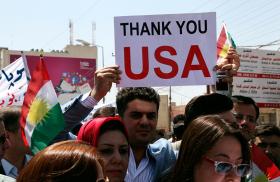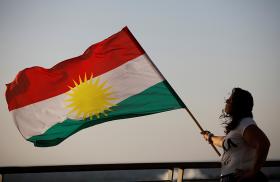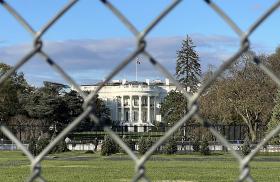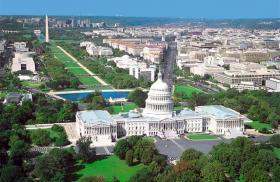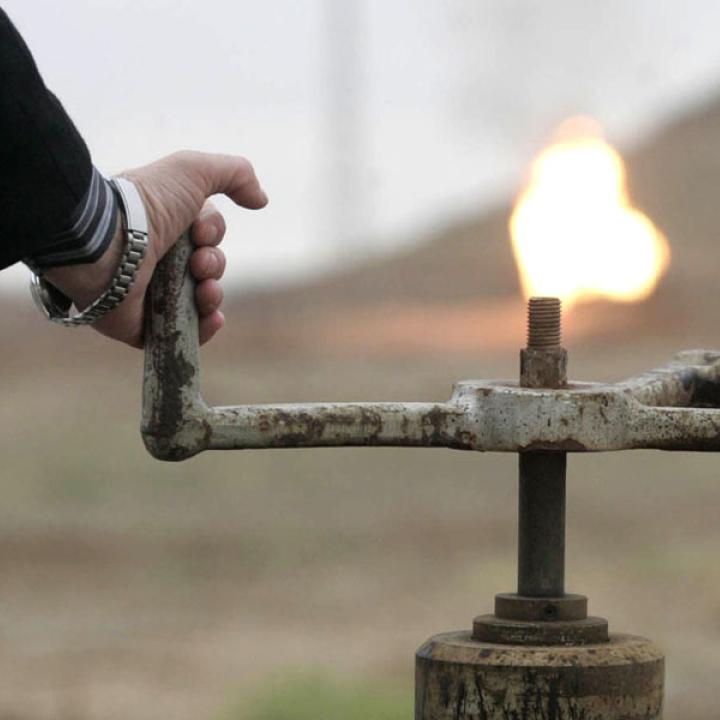
- Policy Analysis
- PolicyWatch 3625
The KRG Turns Thirty: The Future of U.S.-Kurdish Relations in Iraq (Part 3)

Part of a series: The KRG Turns Thirty
Three experts evaluate the KRG’s oil and gas industry and discuss the growing urgency of resolving its disputes with Baghdad.
On June 22, The Washington Institute held a virtual Policy Forum with James F. Jeffery, Matthew Amitrano, and Bilal Wahab, its third event in a three-part series on the KRG's thirtieth anniversary. Jeffery is chair of the Wilson Center’s Middle East Program and former U.S. ambassador to Iraq and Turkey. Amitrano is an energy analyst at the State Department’s Bureau of Intelligence and Research and former deputy economic chief in the Office of Iraq Affairs. Wahab is the Institute’s Wagner Fellow and founder of the Center for Development and Natural Resources at the American University of Iraq-Sulaimani. The following is a rapporteur’s summary of their remarks.
James Jeffery
Due to Russia’s aggression in Ukraine, global oil markets have become ever tighter. The situation serves as a reminder about the importance of great power politics, particularly the fact that countries have taken differing stances toward the global collective security system that the United States leads. In Iraq’s neighborhood, the Kurdistan Regional Government (KRG) participates in this security system, but Baghdad remains conflicted about it and Iran outright opposes it.
As OPEC’s second-highest oil producer, Iraq pumps some 4.5 million barrels per day, almost 5 percent of global production. Although the language in the country’s 2005 constitution is subject to interpretation, it seems clear on two general points: Erbil and Baghdad are to cooperate in developing new oil and gas fields, but Baghdad has sole authority over sales and exports according to Article 110. Over the years, Kurdish officials have attracted numerous international firms with equity contracts that played an important role in development. And thanks to oil federalism, they have established a separate political entity that oversees its own army, resources, and international relations while remaining anchored in Baghdad. Yet the KRG has also created constant friction with the federal government.
Time and time again, the two sides have tried to figure out how to proceed, on some occasions managing to cooperate in getting oil to international markets via Ceyhan, Turkey. Currently, however, the KRG faces a legal challenge from the Iraqi Federal Supreme Court, national litigation, and the threat of international legal action as well. Iran appears to be responsible for much of this pressure, as it opposes the emergence of a strong, autonomous, and economically viable KRG that enjoys good relations with the United States, Israel, and other actors. Indeed, Tehran has been rather successful at curtailing the KRG’s progress toward greater independence, largely by exploiting Kurdish energy disputes with Baghdad.
At the same time, frustration has grown due to Baghdad and Erbil’s policies toward oil companies, who look closely at the deep geopolitical risks prevalent in locales such as Iraq. The KRG’s strategic importance is obvious given its role in Iraq and its effect on internal dynamics between Sunni and Shia Arabs. Yet various actors still strongly oppose the formation of a fully independent Kurdistan anywhere, including in northern Iraq.
The U.S. interest in mediating these disputes is always present, but the question is how big of a priority this issue is for Washington. Oil and gas resources have made Iraq a priority since the 1980s, but the future of the relationship greatly depends on the U.S. regional plan for addressing Iran. President Biden’s upcoming trip to the Middle East is a huge step forward in this regard, since America’s top policy focus should be working on a coalition against Iran, not just fighting terrorism and promoting democracy, as important as those tasks are. The mandate of the UN Assistance Mission for Iraq (UNAMI)—namely, to mediate between Baghdad and Erbil—is a good idea, but the inherent problem at this point is that Iran has enough local influence to ensure that no deal is reached unless other actors intervene.
As for Turkey, its main interest in the Kurdistan Region is to cultivate a friendly KRG that is willing to facilitate Ankara’s ambitions as an energy hub and prevent the Kurdistan Workers Party (PKK) from operating there. Turkey is also invested in containing Iran’s regional activities, and the KRG can help in that regard as well. Ankara is sometimes seen as an unpredictable partner and ally, which limits its diplomacy with the West, but its patronage of the KRG will remain steadfast (though more Iraqi support is needed in Sinjar).
Matthew Amitrano
The KRG’s energy challenges go back to when Iraq’s nationalized its oil sector in 1972. For decades afterward, the Kurds argued that they were not receiving their fair share of revenues, so they eventually began exploring foreign investments in the oil sector. While officials in Baghdad have long expressed antipathy toward such investments, the Kurds were more open to foreign involvement because the majority of Iraq’s oil production occurred outside their territory.
The year 2007 was the dividing line for Kurdistan’s investment strategy, as the KRG had no knowledge base to develop fields on its own and was reeling from disputes with the federal government over oil and gas legislation. By the end of that year, the KRG had signed forty contracts with foreign oil firms. Baghdad and Erbil had already been arguing about “new oil vs. old oil” and internal borders, but their disputes worsened significantly once the KRG opened the door to foreign equity and became more insular in handling contracts.
At first, Turkey was not in favor of the Kurds shielding oil from Baghdad, but Ankara’s policy shifted in 2009 after it appointed a new energy minister. Turkish officials came to realize that the KRG was an important ally and revenue source, particularly with regard to their shared oil pipeline. At the same time, however, they could not afford to ignore Baghdad, hence their efforts to lobby the federal government about extending the transit agreement for the Iraq-Turkey Pipeline.
Yet despite foreign mediation and a common interest in developing their vast reserves, tensions between Baghdad and Erbil persisted, making it difficult to negotiate and contributing to the departure of foreign companies. Three American firms have left Kurdistan over the past few years. The first to depart was Hess in 2015, primarily for commercial reasons. Marathon left under similar conditions in 2019. The most recent company to close shop was Exxon Mobil, which left both southern Iraq and the KRG. This was apparently a business decision spurred by a desire to pursue less-complicated prospects in Africa and Latin America instead. Exxon still hopes to return to Iraq, but it is unlikely to do so unless federal and Kurdish authorities resolve their disputes.
In theory, international oil companies could deal with the tremendous political and security pressures of operating in Iraq by accepting investment terms from the KRG and making sure to get paid by Erbil directly in order to avoid getting kicked out by Baghdad. Yet Iraq’s recent Federal Supreme Court order undermines the entire legal basis of the KRG’s oil and gas industry, making investment much riskier for companies and putting the very concept of oil federalism at risk. Iraqi litigation against Western firms (with the exception of one Chinese subsidiary) is likewise forcing companies to review their investment decisions.
Because the dispute is affecting market stability, Washington must continue engaging with both sides to find a way to make some kind of progress, and quickly. This can be done without touching the most sensitive political issues, at least for now. Given the current political divide in Iraq, the best option is to present an incremental deal that allows both parties to agree on a partial resolution now and revisit the issue every year or two. This would also enable the U.S. government to act as a mediator if the parties ask.
Regarding other resources besides oil, Iraq has not invested much in natural gas because it was long considered a waste byproduct of the oil industry. Even today, much of Iraq’s gas is simply flared away, to the detriment of the country’s coffers and environment. Baghdad still finds it more politically convenient and less logistically challenging to import overpriced gas from Iran than to capture its own gas. Its lone major attempt to do so is the Basra Gas Company, created as a joint venture with Shell, Mitsubishi, and the South Gas Company.
The KRG has the gas resources and potential to export northward, so it needs to look at the best global markets for maximizing its gains. It could also use gas domestically and export it to the rest of Iraq, either as is or in the form of electricity. All in all, Iraq could be a huge player in changing the gas market, but for now it is still missing out on this opportunity.
Regarding renewable energy, Iraq looks at such options from time to time, particularly solar projects. Yet given the rise in environmental problems like drought and desertification, Baghdad and Erbil need to be cooperating more on other energy options (e.g., wind, geothermal, hydropower) as well as water issues.
Bilal Wahab
U.S. investments in the KRG energy industry are a product of Washington’s thirty-year experiment in de facto nation-building in Iraqi Kurdistan. Yet local and national disputes over oil and gas management are undermining America’s main goal in this endeavor, namely, helping Iraq and the KRG get to a point where they contribute to global energy security. This is ever more crucial as market volatility grows due to Iranian and Russian behavior.
Iraq’s 2005 constitution enshrined some Kurdish rights over hydrocarbon management. Yet oil federalism now faces a serious threat from Baghdad’s apparent whole-of-government offensive, with executive, judicial, and military power being employed to exert the federal government’s will. Instead of “competing to the top” by allowing two separate energy policies to flourish, Baghdad and Erbil are locked in a competition to the bottom, resulting in spiteful politics and wasteful, opaque economic practices.
In addition to this year’s Federal Supreme Court order and the various legal summons against oil companies operating in the KRG, Baghdad’s tough approach includes the threat of budget cuts. Meanwhile, unclaimed missile and drone attacks have appeared to complement the federal government’s interests. Yet Baghdad may be pushing against an open door this time—the KRG is weaker and more divided than ever and hence unable to exert leverage at the federal level. Even at home, Erbil’s promising energy sector has become unpopular because of the estimated $20 billion in debt and arrears it has accumulated and the fiscal deficit it continues to run. In short, the KRG’s external challenges are now matched by its petty internal politics.
This summary was prepared by May Kadow. The Policy Forum series is made possible through the generosity of the Florence and Robert Kaufman Family.



